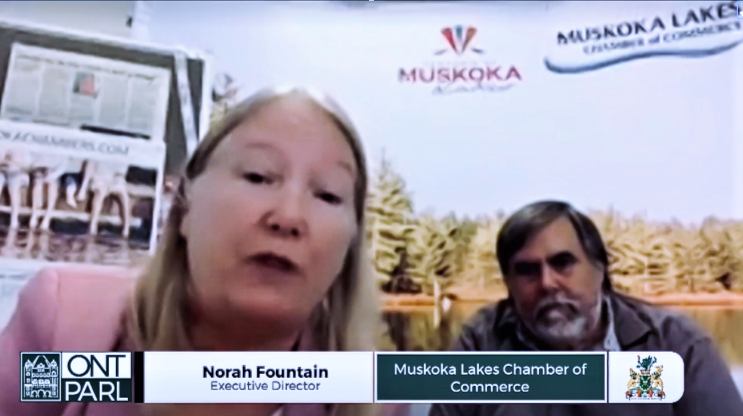MEDIUM WAS MESSAGE IN PUSH FOR ‘ESSENTIAL BROADBAND’
Mark Clairmont | MuskokaTODAY.com
MUSKOKA LAKES — Broadband is essential infrastructure.
Here’s proof.
During yesterday’s online presentation by Muskoka Lakes Chamber of Commerce executive director Norah Fountain, to the standing committee on finance and economic affairs, she said: “we had internet connectivity issues.”
That pretty much summed up her address, as she apologized for the poor quality of a screen capture photo she sent out in a media release today.
“Apparently we had Internet connectivity issues.”
She told the committee: “We’ve got to get smarter, more strategic, all-inclusive and declare broadband essential infrastructure.”
Fountain said the chamber of commerce was invited to speak to the Ontario government committee on Thursday, July 30, about how COVID-19 has magnified the need for competitive broadband in Muskoka.
In her seven minutes she was given to address the all-party committee of MPPs from all parties, she said she “focused on declaring broadband as an essential infrastructure service requiring public investment, more strategic and smart spending on builds that are all inclusive of everyone in any geographic area, and the need for fast and flexible action on the province’s part with its new Improving Connectivity in Ontario, or ICON, funding program.
She said an unexpected demonstration of how rural Muskoka is lacking in reliable broadband was when the presentation froze at times as it was being conducted over Zoom.
She says the chamber office in Bala lacks sufficient bandwidth and capacity for a reliable connection, especially during the busy summer months when everyone is using the existing systems.
Today’s release from Fountain said the following exchange captures her remarks to the provincial committee:
“Thank you, chair. I’m Norah Fountain, executive director of the Muskoka Lakes Chamber of Commerce and past project manager for the Muskoka Lakes-Wahta community broadband project. With me is Neil Smellie, wireless operations manager for Lakeland Networks in Bracebridge. Lakeland rolled out the first 1gig Internet service in Ontario.
“Thank you to the standing committee for this opportunity to speak today regarding infrastructure and the impact of COVID-19 — specifically about broadband. The virus has certainly magnified the issue.
“Together, with partners across Ontario, we’ve worked on bringing better broadband to our region since 1997: That’s when Canada boldly announced it would become the most connected country in the world.
“As you know, we’ve not reached that goal and COVID-19 is shining a strong light on how badly we need better connectivity across Ontario. In 2003, our chamber presented Industry Canada with a robust fibre-wireless combined solution. We were told our broadband plan was one of the best presented, but our region wasn’t big enough to spend $3 million on. We had raised a matching $3 million. Since then millions more has been spent in northern Ontario, yet the job is far from done.
“My point is, we need to spend, but we must get smarter and more strategic on how we do it. Smarter spending will have an immediate benefit to our recovery, our economy overall, our communities, and help Ontario businesses compete on a global scale.
“I’ll come back to that.
“Seventeen years later — and I’m hoping my internet today does not drop from where I’m zooming in from Bala — I have less than one meg upload and four megs down. As you know, the national minimum standard is 50/10. We’re nowhere close.
“But even speed measures are misleading. Capacity needs to be considered. There isn’t enough capacity when several people are online on existing systems. It’s like the Don Valley Parking lot during rush hour. Everything stops.
“We run two separate ISP systems in the chamber office. One is for public WiFi for those who have no internet, and we had to install a second system to be able to do our own business. When we can’t conduct standard business such as installing updates or uploading large files, we drive an hour into neighbouring Bracebridge, which has better internet.
“I’m also a liaison to the Muskoka Recovery Task Force, which has stated broadband is the number one item that needs to be fixed in order for economic recovery post COVID. We have seen an influx of people who want to move here — but lack of decent broadband stops them in their tracks.
“If we don’t do something soon, that economic growth potential will go elsewhere. Outside of Ontario, perhaps.
“Now, everyone gets stuck on the cost. I could speak about socio-economic cost of not doing it, but I’ll spare you that. COVID has demonstrated that for us.
“So, this might surprise you, but I think that Even if the provincial and federal governments increased their funding 20-fold, it might not fix the problem.
“Why? Because for over the past 20 years we have not done broadband builds correctly or equally. Instead, we treat it like a luxury item to be sold only to those in denser areas who can get it and afford it — in areas of easier ROI for the providers. They’re not in business to lose money — don’t get me wrong — and I don’t blame them for being selective.
“But unless incented properly, with the right criteria that makes access for all embedded in your program, your money might not help close this infrastructure deficit at all. Just like funding models have failed to be inclusive in the past. The broadband rollout model across Canada is broken. COVID has shown us we need to fix it. And Ontario could lead the way.
“I have three asks today.
“One: For you to recognize and declare broadband as an essential basic infrastructure, like roads. Not everything can be a profit centre, and if you continue to fund ISPs for specific projects only, there has to be recognition that some areas within those projects will not be profitable. And, as well as chasing low- and medium-hanging fruit, they should have to show how they are also working to be all inclusive.
“Plus, we need to recognize have an urban adjacency problem across
Ontario. Mapping may show service in one spot, but you can almost throw a rock and hit a house that can’t be served. And, in the case of downtown Bala, for example, you need to overbuild because our broadband is so behind here.
“My recommendation is that you fund community broadband networks who partner with municipalities and ISPs in private-public broadband ventures – so no one gets left behind. “And please, do not let Bell Canada’s marketing machine tell you they’ve got the problem solved. They don’t. And won’t.
“Two: We have to speed the process up.
“Streamline the application and funding processes. Cut the red tape. I’ve watched ISPs get grants and go out of business waiting for the public funding announcement and money to flow. Or entire programs get cancelled before any shovels hit the ground. That’s something for you to be careful with regarding ICON. You want shovel-ready projects, but will you be able to act fast enough to get those shovels moving — and will those projects include everyone in their geographic area?
“Three: The province’s ICON program is welcome and 25-cent dollars might cut it in areas of population density, but it doesn’t solve the problem in rural or urban adjacent areas — where people deserve equal access.
“And you’ve all heard the stories of data usage and costs soaring these past few months. The ask is that we need closer to 100 per cent funding if we’re going to get anyone to build out more inclusively. I don’t like the term last mile – certainly COVID has shown us no matter where you live, you need Internet access. For school. For telehealth. For government meetings. For pretty much everything.
“And as an essential service rather than a luxury service, we need to spend public dollars to get it right.
“Before COVID, some of our many rural businesses could manage — they were limping along with cellphones or with the current slow speed internet. But that’s no longer an option. Reliable, true high speed at the minimum has moved from being a luxury to a necessity.
“If you want to protect and grow jobs in Ontario, there is no better investment than scalable broadband infrastructure. We can’t wait for another pandemic to watch more businesses close because they can’t compete; because they aren’t digitally equipped … or discover, yet again, that some kids can’t do school online.
“We simply can’t wait any longer. We certainly can’t wait for supposedly new solutions coming down the pipe. Our businesses have told us, ‘great, you want us to pivot to digital, to ecommerce, but I don’t even have broadband service to my business.’ That’s what they tell us. For them, there is simply nothing to pivot to.
“Neil and I would be happy to answer any questions you may have. Thank you for your time and consideration today.”

Email mark@muskokatoday.com
Celebrating 25 YEARS of ‘Local Online Journalism’
Follow us at Twitter @muskokatodaily
And on Facebook at mclairmont1
Leave your comments at end of story.
Letter to the Editor: news@muskokatoday.com
Subscribe for $25 at https://muskokatoday.com/subscriptions
She offered her apologies for the poor quality of screen capture picture, “Apparently we had Internet connectivity issues during the presentation.”
For more information, contact the Muskoka Lakes Chamber of Commerce at 705 762 5663 or info@muskokalakeschamber.ca
